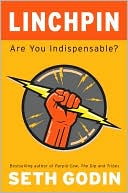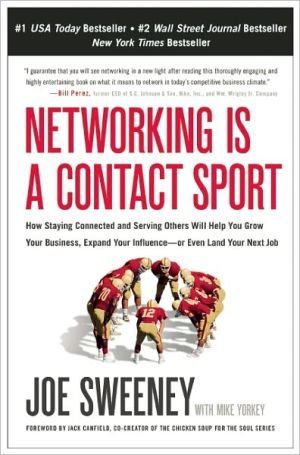The Whuffie Factor: Using the Power of Social Networks to Build Your Business
Everyone knows about blogs and social networks such as Facebook and Twitter. And they've heard about someone who has used them to grow a huge customer base. Everyone wants to be hands-on, grassroots, and interactive. But what does this mean? And more to the point, how do you do it?\ While The Whuffie Factor traverses the landscape of Web 2.0 and shows how to become a player, it is not just another book about online marketing. People see the huge business potential of the online world and the...
Search in google:
"The Whuffie Factor" is a breakthrough audiobook that provides the strategic map and specific tactics for success in the lucrative but strange and elusive world of online communities. Publishers Weekly Starred Review. Hunt, cofounder of community-marketing consulting firm Citizen Agency, presents the hows and whys of accruing "whuffie," her word for social capital in the Web 2.0 landscape. Introducing a wide range of post-blogosphere social networks like Facebook, LinkedIn and Flickr, Hunt clues in marketers to the possibilities with online success stories, influential voices and winning strategies. Numerous anecdotes (from the Obama campaign, online t-shirt boutique Threadless, Zappos.com CEO Tony Hsieh, etc.) illustrate the power of even the most tossed-off communiques; micro-blogging site Twitter, for instance, may restrict posts to 140 characters, but is uniquely powerful in its ability to reach a swarm of "followers," establish new relationships and provide multi-various feedback. Hunt packs in many specific strategies and concepts, which include seeking out and incorporating feedback, educating and empowering your connections, and treating your company's message as a conversation (a good net marketer's goal should be contained in the statement, "I want to create a culture of..."). Detailed, practical profiles of networks and related tools make this a valuable, illuminating title for anyone looking to the ever-expanding realm of online social life for business success. Copyright © Reed Business Information, a division of Reed Elsevier Inc. All rights reserved.
1\ HOW TO BE\ A SOCIAL CAPITALIST\ If someone comes up to you and, out of the blue, asks: "How's your whuffie?" don't call security.\ I'll explain why shortly, but initially I want to make a couple of assumptions: first, that, like everyone in business—from a Fortune 500 company to the start-up just opening its doors—you want to be more hands-on, _grassroots, and interactive to maintain a continuous flow of information to and from your customers; and, second, that you've seen a steady rise in the money you spend for marketing and promotion but a decline in the return on that investment. Yet every time you turn around, there seems to be a story about a business that's grown a huge customer base at little or no cost by catching the Web 2.0 wave—the world of mass collaboration and social networking—using blogs, Facebook, MySpace, Twitter, and other social networking tools. But when you go online and check them out, all you see is a bunch of chatter and noise. So, you think to yourself, "How do I make sense of it all?"\ The question is how to do it. Catching the social networking wave of Web 2.0 is neither as easy nor as straightforward as it might seem at first blush. Simply spending money and trying to buy your way into online communities works about as well as a dude in a Brooks Brothers suit trying to fit in at the skateboard park.\ To succeed in this Web 2.0 world, you have to turn conventional wisdom on its head and become a social capitalist. A social capitalist is as ravenous as corporate titans like John D. Rockefeller and Bill Gates for success, but the coin of the realm is different. People are on social networks to connect and build relationships. Relationships and connections over time lead to trust, which is the key to capital formation. The capital I'm talking about, though, is not of the monetary variety. It is social capital, aka whuffie, and a social capitalist is one who builds and nutures a community, thereby increasing whuffie.\ Once whuffie is "in the bank," monetary capital then starts to flow from social capital. It used to work the other way around. Of course, rich individuals and big companies still have lots of influence, but we're talking here about an emerging world where the rules for success are truly different. If a company tries to buy its way into social networks, the law of unintended consequences kicks in and its social capital starts to diminish. Without social capital, connections in online communities are lost and any recommendation made will be seen as spam, met with negative reactions and a further loss of social capital. So, if someone asks about your whuffie, what she's really getting at is how well you are dealing with the tricky proposition of growing your business in the Web 2.0 world of social networking.\ HOW WHUFFIE CAN BUILD YOUR BUSINESS\ What it comes down to, in this Web 2.0 world, is that there really are only three ways to build a business and make money online: porn, luck, and whuffie.\ Pornography, of course, needs no introduction, but I can neither endorse it nor advise you on it. I'll cringe, though, and admit that we owe it a debt of gratitude. The online porn industry pushed the adoption of much of the technology we know, use, and love today. Video and audio streaming, geo-location software,1 and interactive-type content, such as cookies (used today by sites like Amazon.com and Google), help you find exactly what you need by recording data and storing it each time you return, then returning better and better results. Of course, porn also gave us despicable black-hat tactics like pop-ups and spam. Although effective, they're not tactics I encourage you to use, unless alienating customers and muddying your reputation is your end goal.\ Getting extremely bloody lucky is the second way to make money online. I have been working in online marketing for close to a decade and have seen people who struck it rich by being in the right place at the right time. There are, however, rarely consistent patterns for these lucky folk.\ Okay, so porn is out and luck is a crapshoot. That leaves whuffie, the only predictable way to both build a business and make money online.\ The term "whuffie" was coined by Cory Doctorow, creator of the popular blog Boing Boing, to describe social capital in his futuristic science fiction novel Down and Out in the Magic Kingdom.2 In the future as envisioned by Doctorow, whuffie is the only currency used. Other currencies—dollars, euros, renminbi, whatever—will simply disappear.\ WHAT IS WHUFFIE, ANYWAY?\ Whuffie is the residual outcome—the currency—of your reputation. You lose or gain it based on positive or negative actions, your contributions to the community, and what people think of you. The measurement of your whuffie is weighted according to your interactions with communities and individuals. So, for example, in my own neighborhood, where I have built a strong reputation for being helpful, my whuffie is higher than when I travel to another neighborhood where nobody knows me. There, members of that community "ping" my whuffie to find out whether I can be trusted. But for me to be fully welcomed, I can't simply use my whuffie account; I need to be helpful there as well. And I can do that, as Cory Doctorow points out in Down and Out in the Magic Kingdom, in three ways: be nice, be networked, or be notable. I'll explain the how-tos of all three whuffie-building strategies over the course of the book.\ In this futuristic world, if you need a hotel room, a car, or fare for a ride on the bus, you will pay with your whuffie. It isn't a card or a piece of paper; your whuffie is stored on your person and anyone can ping your internal computer to figure out how whuffie wealthy (or poor) you are.\ Yes, this is an idea from science fiction. In reality, though, the importance of social capital is neither fictional nor in the future. In every online community I've been part of, whuffie is a core component of connection; in many cases it is more valuable than money. Since the basis of these social networks is trust, something must determine how I value the differing opinions of the 2,000-plus "friends" I have on Facebook. In online communities, a friend can't pay me to make a certain choice or have a certain preference. That would be seen as dishonest and would damage my whuffie. Financial transactions don't mean much of anything in the world of online communities. They work antithetically to it. Financial transactions are part of the market economy, whereas whuffie is part of the gift economy, where services are performed without need for direct payment.\ In the gift economy the more you give away, the more whuffie you gain, which is completely opposite from currency in the market economy, where when you give away money, it's pretty much gone. Saving whuffie for a rainy day doesn't work as well as saving money for a rainy day. Whuffie increases in value as it circulates throughout the community; for instance, when I use my whuffie to help you raise yours, there will be a net increase in whuffie for both of us. As it circulates throughout the community like this, it inherently connects people. This really is the key to creating wealth online, and I'll be returning to this concept throughout the book.\ You may be saying to yourself, "Well, this is very interesting but I live in the real world! What about paying my rent? Paying my employees? Saving for retirement or sending my kids to college?" Of course! Day to day, you still need $1.99 to buy that quart of milk, but in online communities that $1.99 won't do you much good. We're dealing with two parallel but valid economies here. Market capital now flows from having high social capital. For example, if you are on the job market, you are probably competing with dozens of other candidates with similar qualifications. However, having lots of social capital will put you ahead of the competition if you have good connections that can recommend you for the position (network); if you have a list of public accolades on the work you've done (notable); or if your references have glowing reviews of your ability to lead a team and your likability (viewed as being nice). Having high social capital will give you access to better positions with better pay.\ The same goes for your business. There is a great deal of competition in the marketplace. Having lots of social capital will make you stand out: You've really connected with many of your customers, who spread the word to their network; people talk about your product because it is notable; or you have a record of having the best customer service, and customers who have bought elsewhere now go to you because they know they'll be treated better. Having high social capital will help you win customers and sell more product.\ It used to work more in the opposite direction. Those with lots of money used to have more influence. When you had money, you could buy more advertising, which was more influential before the Internet because your message could reach a wider audience than word of mouth. Money still carries clout and you can still buy your way in front of large audiences, but this doesn't guarantee influence. The stories in this book will demonstrate, time and again, that those with social capital have enormous influence. The myriad of social media tools I introduce have given people without much money, but with lots of whuffie, the ability to broadcast messages to large audiences. And because they already have relationships with these audiences, they are more likely to have influence. Market capital and social capital are converging more than many recognize. There may even come a day that social capital is seen as viable currency in the market economy.\ There are clear advantages to raising whuffie. For one, as you build whuffie, you build relationships with your customers that yield longer-term loyalty. Second, the more whuffie you have, the more people will talk about you in a positive light. The positive word of mouth carried through networks is the core advantage to involving yourself in online communities. Whuffie is also a low-cost, high-energy type of strategy, whereas buying advertising spots can be quite expensive. And although it is difficult to track the impact of, say, a billboard on the side of a building, the impact of your involvement in online communities is almost immediate. Many of the tools used to connect communities, like blogs and wikis, have direct ways to collect feedback from community members.\ But the most immediate reason why raising whuffie is essential for your business is that your competitors are either doing it or thinking about doing it right now. As online communities become a stronger and stronger source of consumer information, your sales will be driven by how well you are received in those communities.\ THIS BOOK IS BUILT ON WHUFFIE\ Let me give you an example from my personal experience: this book. It exists because of my whuffie, the sum of my reputation, influence, bridging and bonding capital, access to ideas and talent, access to resources, potential access to further resources, saved-up favors, accomplishments, and the whuffie of those I have relationships with. Neither the opportunity nor the adventure of writing it would have happened without the many years I spent building my reputation, contributing to communities, meeting amazing people, and openly giving away my ideas.\ I started blogging about my theories on social networks and using them for community marketing and the growing popularity of social technologies such as wikis, blogging, and photo sharing in 2004 on Horsepigcow.com. At first my blog was just a place for me to throw ideas against a wall and see if they would stick. I didn't expect many people to actually read it besides close friends and my mom. What was surprising to me is that people did start reading my blog and commenting on posts, giving me feedback and encouraging my way of thinking about marketing. As my ideas evolved and as I interacted with other bloggers writing about marketing and technology, more and more people found my blog posts and started to respond.\ After about a year of blogging, I got my first opportunity to try out my theories about the influence of social capital when I was hired by a start-up in the San Francisco Bay Area, an opportunity that came to me because of the contacts I was making through my blogging. This allowed me to test my ideas "in the wild"; that is, with a company developing a product and preparing to launch it into the marketplace. The results were phenomenal. Riya.com, a photo-searching website that uses artificial intelligence technology to search inside of the photos for faces, was the start-up I helped launch with community marketing. Within a day of the launch of the _website, 20,000 people signed up and uploaded more than 1 million photos to be searched.\ This success won the attention of a wider audience, and conference organizers started to ask me to come and speak in front of live audiences. Although I had little experience as a public speaker, I quickly found out that I loved it. It was through these speaking engagements that I got the opportunity to meet more people face-to-face and exchange ideas and case studies. I continued to write my blog, speak, and record all of my progress along the way by sharing photos, ideas, research, gaffes, and successes. My audience kept growing until a partner and I were able to launch our very own consultancy in 2006. From day one, we had clients and multiple opportunities. As others learned from my adventures, they would refer back to me and my work, extending my network even further.\ Then one day I received an e-mail from a longtime reader of my blog who happened to be a literary agent. She wrote, "I like your original ideas and stories. Have you thought about writing a book?" I had many times, but I didn't expect to be approached about it so soon. I put my research and stories into a proposal for this book and was writing it by the end of 2007.\ The fact that I openly shared my stories of success and failure led to this opportunity, but the benefits of whuffie didn't end there. As I wrote, people shared interesting case studies, gave me feedback, told me their own stories, and even helped design the cover! Many of those who helped are people I met through my travels, but there were also some whom I've never met face-to-face and who live all over the world. Some are friends of friends, and others have stumbled upon my work through referrals from other bloggers.
\ Publishers WeeklyStarred Review. \ Hunt, cofounder of community-marketing consulting firm Citizen Agency, presents the hows and whys of accruing "whuffie," her word for social capital in the Web 2.0 landscape. Introducing a wide range of post-blogosphere social networks like Facebook, LinkedIn and Flickr, Hunt clues in marketers to the possibilities with online success stories, influential voices and winning strategies. Numerous anecdotes (from the Obama campaign, online t-shirt boutique Threadless, Zappos.com CEO Tony Hsieh, etc.) illustrate the power of even the most tossed-off communiques; micro-blogging site Twitter, for instance, may restrict posts to 140 characters, but is uniquely powerful in its ability to reach a swarm of "followers," establish new relationships and provide multi-various feedback. Hunt packs in many specific strategies and concepts, which include seeking out and incorporating feedback, educating and empowering your connections, and treating your company's message as a conversation (a good net marketer's goal should be contained in the statement, "I want to create a culture of..."). Detailed, practical profiles of networks and related tools make this a valuable, illuminating title for anyone looking to the ever-expanding realm of online social life for business success.\ Copyright © Reed Business Information, a division of Reed Elsevier Inc. All rights reserved.\ \ \ \ \ \ From the Publisher"A valuable, illuminating title." —-Publishers Weekly Starred Review\ \








